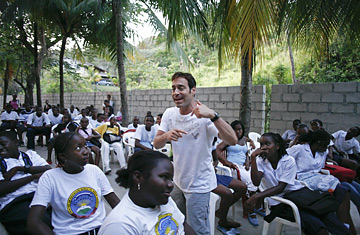
AIDS activist and motivational speaker Scott Fried talks to students about AIDS prevention at the Santos Guardiola School in Punta Gorda on Roatan Island, off the coast of Honduras.
"The rates are alarmingly high for such a small community," says Scott Fried, a wiry, clean-cut AIDS activist from New York City, who recently spent an afternoon knocking on doors in Flowers Bay, an impoverished community of brightly painted strip-wood houses on stilts on Roatan. Fried stepped gingerly over small piles of festering rubbish as he made his way along dirt roads to find a venue for one of his lectures on AIDS prevention. Fried, 43, first discovered the island six months ago when the cruise ship he was on docked there for six hours. When he found out that Roatan was in the midst of what he called an AIDS emergency, he resolved to return and do his part.
Although Fried, a self-described motivational speaker and author of two books, is used to traveling around the U.S. and the world speaking to teenagers in well-appointed high school auditoriums, he was forced to be resourceful on Roatan, where the municipal hospital has no running water and many of the Hispanic and Afro-Caribbean residents believe that they can get HIV by stepping on a chicken bone that has a hex on it. "It was totally heartbreaking when I first came here, and talked to teenagers who have HIV," says Fried, a former Broadway actor who has been living with the virus for nearly twenty years and has seen 134 friends and acquaintances die from AIDS-related causes.
HIV began to spread rapidly on Roatan after Hurricane Mitch in October 1998, when thousands of mainland Hondurans, left homeless and destitute by the storm, moved to Roatan seeking jobs in the tourism and development boom. Unable to find even the most menial employment because they could only speak Spanish (islanders speak both English and Spanish on Roatan), many turned to prostitution, fueling an already burgeoning rate of infection.
While most of Fried's lectures on the island were organized by an NGO called Familias Saludables, he was determined to address as many people as possible during a recent week-long stay. Hours before the Flowers Bay talk, which had been canceled because the organizers could not find a proper venue, he found Mrs. Warner, a wizened elderly resident, who offered up her front lawn — a patch of windswept dirt — for the event. Fried managed to borrow several plastic chairs from the Sea Breeze Bar across the street. A single lightbulb hooked onto a long electrical cord and suspended from an old wooden ladder was rigged up as a spotlight as Fried addressed a small group of local residents.
"My name is Scott Fried, I live in New York City, and this is what HIV looks like on a man," said Fried, addressing his audience — two young mothers breast-feeding their infants and a group of young toughs in stiff new blue jeans chain-smoking cigarettes. He reassured them that you can't get AIDS from touching someone who is infected or breathing the air after they sneeze, and you can't get AIDS from a child who is infected with HIV. Fried, who is gay, also told them what it had been like to tell his conservative Jewish parents that he had the virus.
By the end of the evening, some people were fighting back tears. They lined up to shake Fried's hand, grateful for the inspiration and a small pile of free condoms.
